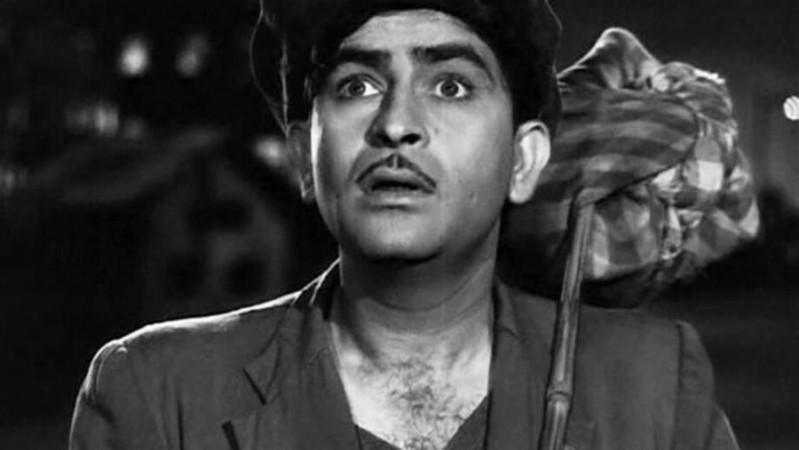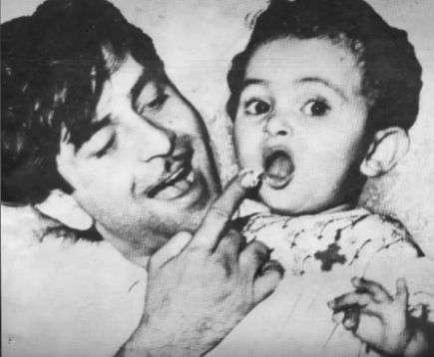Cinema often reflects a country's psyche, and its historical, political, economic state during a given time frame. The partition was a traumatising phase for India after independence where not only citizens but also the talent pool had been uprooted to re-establish themselves in the new country.
Raj Kapoor: From Pakistan to India
For Raj Kapoor, who was a Pathan Hindu, it was a difficult journey to cut himself off from his ancestral roots in Pakistan and re-settle in Mumbai. What scarred the nation more was the violation and exploitation that took place during the division of India. Despite these monumental tragedies, the Indian cinema, which was then known as the Hindustani cinema surged undaunted due to the contribution of Raj Kapoor, the greatest showman of Indian cinema. Bollywood as a term originated in the 90s with the coming of Khans and liberalisation of the Indian cinema industry.

Raj Kapoor's entrance in Bollywood, Hindi film Industry
Many members of the Indian People's Theatre Association (IPTA) settled in Bombay after 1947 and Raj Kapoor, who was the son of theatre personality and film actor Prithviraj Kapoor, too found a place here.
It wouldn't be completely wrong to say that Raj Kapoor too was a 'product of nepotism' but it would be fair to state that he made use of the opportunities presented to him and made the best of it, leaving behind his peers who disappeared soon after. Moreover, he has taken the Indian cinema to a significant new level. According to author Madhu Jain, in the book 'Kapoor: The First Line of Indian Cinema', Raj Kapoor initially wanted to join the Navy but due to several reasons, he was unable to serve the country in uniform.
Raj Kapoor: His Russian influence OR Influence in Russia

Director, screenwriter, novelist, K. A. Abbas had adapted Raj Kapoor's Arya Samaj upbringing and added a dash of romance in various films such as Barsaat, Desh Mein Ganga Behti. They weren't just a hit in India but also became popular in the Soviet Union (now Russia). Due credit for the commercial success of these films should also be given to the music composers Shankar-Jaikishan duo who, perhaps at Abbas' suggestion, adapted Bylo-Russian folk tunes and set them to Hindi lyrics.
A significantly popular example would be Shailendra's 'Awara Hoon' from the film Awaara, which became a rage in Russia and other Soviet-bloc countries in Eastern Europe. Shankar-Jaikishan's music for Kapoor's films was, in the main, raga-based.
These cultural aspects gave rise to Raj Kapoor's career as an actor, director and screenwriter. It was also Nargis whose presence rescued the RK Studios from bankruptcy. Raj Kapoor's style for all its superior craftsmanship was tethered to the idea of Utopian socialism, which then Prime Minister Jawaharlal Nehru wanted to usher in using the soft power of cinema.
Raj Kapoor: Exploration of the toils of a common man
On political grounds (in today's times) many may disagree with the ideas of Raj Kapoor's films. The rich men were brutal and cruel, hospitals only performed surgery to cut you open, and the poor men were always kind at heart. In Shree 420, when Raj (a character name he often adapted on-screen) switched his personality when he entered the rich men's club and took to alcohol, the song 'Mudh Mudh ke naa dekh' aptly suggested that Raj shouldn't look back at the days of his struggle though it implied in the movie about parting ways with Nargis.
It was probably the cinematic magic, but Kapoor's films have a way of changing with the times. The audience of the Nehru era, Indira Gandhi era, Shashtri era, Narasimha Rao era, Manmohan Singh era, Modi era -- would all reflect the contemporary political, social and cultural impact on society at large.

















